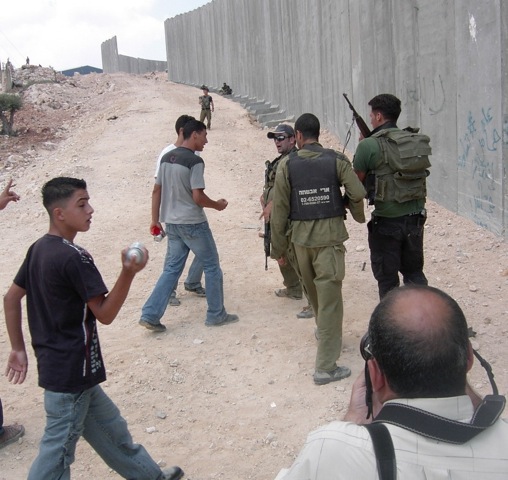This summer I’m doing interviews with Palestinian journalists and refugees in which I ask them to interpret and critique U.S. news articles. Why, you might ask, did I choose journalists and refugees as my commentators? Why didn’t I try to obtain a broader cross-section of Palestinian society?
In looking for Palestinian commentary on U.S. news articles, I knew that I couldn’t find one Palestinian voice that would represent all Palestinians. Not all Palestinians would respond to an article in the same way. Instead, I wanted to select types of people whose voices tend to be excluded not only by U.S. media, but also by their own political processes, like those of the less-than-democratic Palestinian Authority.
Refugees certainly fit this bill. Palestinian refugees were forced to leave their home villages and cities in 1948. Since then, Israel has refused to allow them to return to those homes. A United Nations agency, the United Nations Relief and Works Agency (UNRWA), set up temporary houses for them in dozens of camps in the West Bank, the Gaza Strip, Lebanon, Jordan, and Syria. Though refugees share a common claim to their right to return to their home villages, on a practical level, they have fared differently in each location.
In the West Bank and Gaza Strip, refugees are constrained in the same ways as non-refugees by the Israeli military occupation. However, refugee camps are distinct communities, physically set apart from other neighborhoods. For example, you know you are entering a refugee camp because the streets are narrower. Refugees are also slightly poorer than the rest of the Palestinian population. Moreover, for decades refugee camps have led challenges to Israeli occupation. This has made refugees a significant political group in Palestinian society.
Yet sympathetic U.S. human interest stories about Palestinians often report on middle class or wealthy Palestinians who work in computer technology, run fancy restaurants, or open cinemas. If we do not attend to the voices of other Palestinians, we will exclude an important part of Palestinian society from political dialogues in the news.
My reasons for asking journalists to comment on articles are a bit different. This is a part of a larger project in which I study how Palestinian journalists contribute to the production of U.S. news. Palestinians work as reporters, producers, fixers, and photojournalists for U.S. news organizations. Photojournalists and reporters gather information to be shaped by writers and editors. Fixers and producers guide foreign correspondents to information. Rarely, however, do these Palestinian journalists select a feature story and write it exactly as they would like.
So with this project, I wanted to give them the opportunity to comment on stories that they might have worked on, but may not have seen in their final forms. I also wanted to talk to journalists because I presumed their expertise on the craft of reporting would allow them to make specific critiques, but also be sympathetic to the challenges of this work.
In my interviews, I’ve found a lot of diversity within the refugee and journalist groups themselves. One refugee had the sharp critical eye I expected from journalists due to his frequent attendance at protests. [Just from the descriptions and quotes in an article on a demonstration, he surmised that the journalist made the report while standing with the Israeli commmander repressing the protest, rather than with the protesters]. One journalist was harshly critical of an article by a Palestinian journalist while another embraced it – but neither referred to technical aspects of the reporting, like where the journalist might have been positioned or whether the journalist should have spoken to different sources.
Even when people were critical of an article, they presented different reasonings. For example, an article described a new and expensive restaurant as evidence that the Ramallah economy was picking up. One journalist’s opinion was that such restaurants were not where most Palestinians liked to have fun. Rather, she and her friends liked to go to coffeehouses. Also, they socialized during the day, not at night. One refugee commented that this restaurant in particular was only for the wealthy. If he wanted to write an article about whether or not the Palestinian economy was picking up, he’d talk to vegetable sellers, rather than restauranteurs, since, after all, everybody buys vegetables. This rich variety of responses, I thought, was one reason to continue these kinds of conversations.
This research was funded by the Tufts University Faculty Research Fund.
Amahl Bishara is an Assistant Professor in the Anthropology Department at Tufts University. This is the 3rd and last post in a series of 'Fieldnotes' she has written for www.anthronow.com. You can find her previous posts under the 'Fieldnotes' category.



One Response
Many thanks for these postings. The project sounds really fascinating and empowering for both the reader and your informants. The label of refugee is interesting. Do you find it to be one that changes dramatically, depending on whether a refugee is speaking to locals or foreign media?